- within Privacy, Technology, Media, Telecoms, IT and Entertainment topic(s)
- with Inhouse Counsel
Outline
- Introduction
- Navigating the Customs Recordal Process
- Enhancing IP Awareness through Customs Training
- Ex-officio Customs detention of suspected illegal shipments
- Customs Seizure of specific shipment based on IP right owner's request
- Actions Taken by Thai Customs Against Infringing Products
- Emerging Trends and Challenges in IP Border Protection in Thailand
Introduction
The importation of counterfeit, imitation, and infringing products has long presented significant challenges in Thailand, impacting both the government and rightful owners of trade marks and copyrights. These illicit activities result in lost tax revenues for the government, pose health risks to consumers, and harm the brand reputation and revenue of rights holders.
To address these issues, Thai Customs plays a vital role as the first line of defense against illegal imports. Since as early as 1987, Customs has been actively intercepting counterfeit goods at Thailand's borders through proactive inspections. They possess the authority to seize products based on trade mark or copyright infringement and tax evasion, among other violations.
Below are the statistics on the annual number of raid actions and items seized by the Royal Thai Police, the Department of Special Investigation, and Customs, sourced from the Department of Intellectual Property's website: https://www.ipthailand.go.th/en/ipr-enforcement-operation/item/staticpp_dipyear-aug2567.html The statistics indicate that Customs is successfully seizing a substantial number of counterfeit products each year.
In recent years, the Customs recordal process has emerged as a vital mechanism for enhancing the protection of intellectual property (IP) rights. This article delves into the intricacies of the Customs recordal process in Thailand, providing insights into its application, the required documentation, and the role of Customs officers in identifying and detaining infringing products. It also explores the importance of ongoing training for Customs personnel to bolster their ability to recognize counterfeit goods and enforce IP laws effectively. By understanding these processes and fostering collaboration between rights owners and Customs, stakeholders can significantly improve the enforcement of IP rights in Thailand.
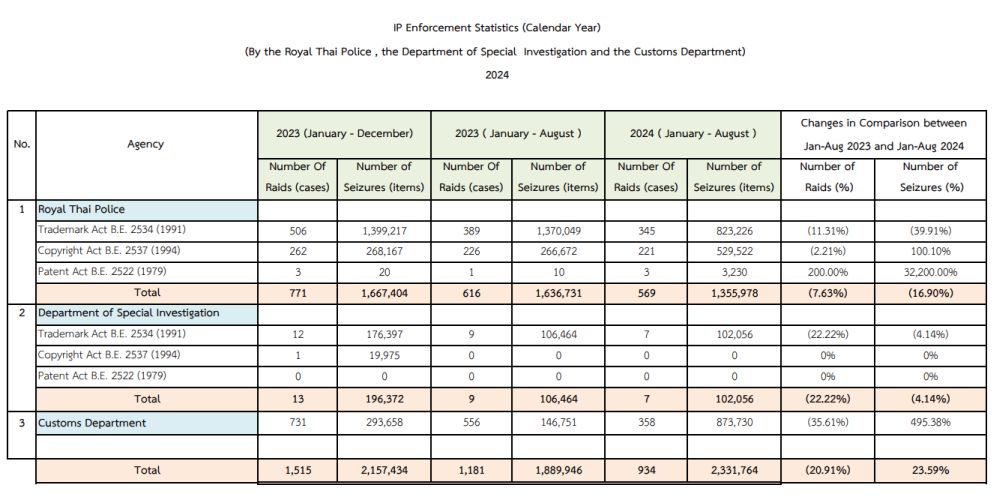
Source: https://www.ipthailand.go.th/en/ipr-enforcement-operation/item/staticpp_dipyear-aug2567.html
Navigating the Customs Recordal Process
Customs recordal serves as a vital mechanism for protecting trade marks and copyrights, enabling Customs officers to work directly with rights owners or their representatives when counterfeit products are suspected.
Across Asia, Customs authorities are becoming increasingly proactive in combating counterfeit goods by implementing advanced Customs recordal systems to enhance enforcement efforts. Each country has its unique approach and fee structure for these recordal services:
- China: A Customs recordal costs USD 100 per trade mark or copyright, offering strong protection against infringement.
- Vietnam: For just USD 10, a single Customs recordal application covers unlimited trade mark registrations, patent certificates, and copyrights, providing comprehensive protection.
- Indonesia: Customs recordal is available without an official fee, making it a cost-effective option for IP protection, although it only permits the recordal of trade marks.
- Thailand: Customs recordal incurs no official fees and allows for the recordal of both trade marks and copyright works.
In Thailand, the process is streamlined by the Ministry of Commerce Notification on the Determination of Counterfeit Goods and Pirated Goods as Prohibited Goods from Export, Import, and Transit, B.E. 2565 (2022), and Customs Department Announcement No. 106/2565. Since July 29, 2022, rights owners with trade marks or copyrights registered with the Thai Department of Intellectual Property (DIP) can utilize the new Thai Customs IPR Recordation System (TCIRs) system for Customs recordals. Applications can be submitted through the TCIRs website (https://thaiipr.customs.go.th/ipr-app/) at no official cost. However, obtaining a certified extract of the trade mark registration from DIP incurs an official fee of approximately USD 6 per trade mark.
Required documents for Customs Recordal in Thailand include:
- A Power of Attorney (POA) signed by the rights owner's authorized signatories, notarized by a notary public, and legalized at the Thai embassy/consulate.
- A copy of Company Certificate or Certificate of Good Standing, notarized by a notary public, and legalized at the Thai embassy/consulate.
- A certified extract of Trade Mark Registration from the DIP, or a copyright ownership document (if available).
Rights owners and their representatives may also provide guidelines on distinguishing genuine products from counterfeits and specify the ports of importation for genuine products to assist Customs officers in their inspections.
Application Process
The Customs recordal application process involves submitting information about trade marks or copyrights, details about the goods, and uploading the required documents and optional information on the TCIRs website. After completing the online submission, rights owners or their representatives must schedule an appointment with a Customs officer to present the original documents for review. The application status can be tracked online via the TCIRs website.
Upon approval, Customs recordal remains valid for three years or until the recorded trade mark or copyright protection expires, whichever comes first. Renewals can be requested at least 30 days before the expiration date. Modifying or updating information in the Customs recordal is possible through the TCIRs website after approval, with no official fees incurred.
The process is efficient, user-friendly and comes at no cost. Once all required documents are uploaded and presented in person, Customs recordal can typically be completed within 1 to 2 working days—significantly faster than in some other countries where the process may take up to 30 working days.
As of August 2024, approximately 1,100 Customs recordal applications have been approved, with trade marks accounting for 95% and copyrights for 5%.
While this process is relatively new, Customs is actively developing training programs for its officers on how to effectively use the TCIRs. As of August 2024, the adoption of TCIRs among Customs officers is still limited. In instances of detaining suspected illegal products, many officers at borders and Customs posts may refer to the DIP's trade mark database to contact trade mark representatives or consult those who have recently undergone Customs training.
Enhancing IP Awareness through Customs Training
For rights owners aiming to strengthen IP protection via Customs, the initial step is to file for Customs recordal. The subsequent step involves providing regular training sessions to enhance the familiarity and awareness of trade marks and copyrights among Customs officers. This foundational knowledge equips officers to better identify counterfeit products. Furthermore, ongoing training fosters collaborative relationships with Customs and other law enforcement agencies.
Thai Customs does not conduct its own training events. Instead, rights owners, through their representatives, should coordinate directly with Customs to schedule sessions that are mutually convenient. Most trainings take place in Bangkok, where other relevant law enforcement agencies—such as the Department of Special Investigation (DSI), Department of Intellectual Property (DIP), Economic Crime Division (ECD), and Consumer Protection Police Division (CPPD)—can also be invited. These agencies frequently participate in Customs training sessions due to their shared mandate in combating IP infringement.
Annual training is recommended to keep pace with the continuous influx of imported products and the growing number of trade marks and copyrights. Regular refresher courses are essential for maintaining and enhancing Customs officers' awareness of brand owners' IP rights.
In addition to the training in Bangkok, rights owners may consider organizing sessions outside the capital, particularly when a trend of illegal products is identified at specific Customs posts. For example, at the Aranyaprathet port on the Cambodia-Thailand border, counterfeit clothing and personal items are often encountered. Similarly, the Sadao Customs House port on the Malaysia-Thailand border has seen frequent detections of suspected counterfeit fuel and alcoholic beverages. Targeted training sessions for brands in the clothing, fuel, and beverage sectors at these ports would be highly beneficial.
Ex-officio Customs detention of suspected illegal shipments
When suspected counterfeit products are identified, Customs officers promptly detain them and initiate preliminary screenings to evaluate their authenticity. Following this, they reach out to the rights owners or their representatives, typically by phone, followed by a formal request letter sent via courier or mail to verify the product's authenticity. Officers may include one or two photographs of the suspected items for initial assessment. If these images are insufficient, representatives can request additional photographs or access to the detained products, depending on their storage conditions.
According to Customs' procedures for detention and notification, a verification letter from rights owners or representatives must be submitted within three days of receiving the formal request from Customs.
In the rare event that an importer or exporter asserts that the seized products are genuine, rights owners or representatives may submit a verification letter along with a request for execution within three days of receiving Customs' notification. A seven-day extension for verification may also be granted. In such cases, officers may request a guaranteed deposit, the requirement and amount of which are determined at the discretion of the responsible authority. However, such requests are extremely uncommon, and there have been no documented instances of this occurring.
If rights owners or representatives fail to verify the authenticity of the seized products by the deadline, officers may involve a third-party specialist. This specialist might include individuals closely associated with the brand owner in Thailand, such as sales assistants or brand managers, to confirm authenticity within 15 days of non-response. Based on our experience, Customs seeking a third-party specialist is virtually unheard of.
In practice, Customs often extend their monitoring of brands beyond official Customs recordals. They may detain products bearing trade marks listed in the DIP database, which is publicly accessible via this link: https://search.ipthailand.go.th/. This extended monitoring involves cross-referencing seized goods with the trade marks recorded in the DIP database to identify potential infringements.
While extended monitoring by Customs is a viable option, it is advisable to maintain Customs recordals and provide training to maximize the chances of successful Customs detentions.
Customs Seizure of specific shipments based on IP right owner's request
When rights owners become aware of a specific shipment of infringing products, they can request Customs to detain the shipment by submitting a POA along with a formal request letter for examination.
Once the validity of the POA is confirmed, Customs officers will notify the rights owners or their representatives to attend the physical examination of the shipment within 24 hours. If the products are determined to be infringing, the rights owners or representatives must promptly provide an authentication verification letter and submit a request for execution within three days following the examination.
Actions Taken by Thai Customs Against Infringing Products
Once products are confirmed to infringe trade marks or copyrights, offenders face severe penalties, including confiscation of counterfeit goods and fines of up to four times the total value, including taxes. Penalties may also include imprisonment for up to 10 years, or both fines and imprisonment. In practice, fines are the most common form of punishment. Thai Customs will seize and store the infringing products in its warehouses, organizing annual destruction at no cost to the rights owners. This destruction is conducted in collaboration with the private sector, utilizing environmentally friendly waste disposal methods.
For instance, the 2024 Destruction Ceremony of Intellectual Property Rights Infringing Goods in Bangkok was hosted by INSEE ECOCYCLE, which used rollers, compactors, and cutting equipment for the destruction of confiscated items. Esteemed attendees included the Minister of Commerce, the Director-General of the DIP, the Police Commander, the Director-General of Customs, the Director-General of the Department of Special Investigation, and the Commander of the Royal Thai Army Air Defense Command. Rights owners, their representatives, and journalists were also invited to witness the event. Additional destruction ceremonies were held in Chonburi and Saraburi provinces, extending the efforts beyond Bangkok.
The 2024 Destruction Ceremony of Intellectual Property Rights Infringing Goods in Bangkok was conducted in a formal and impactful setting. This event underscored the government's dedication to enforcing IP rights through a meticulously organized destruction process, as depicted in the images below.
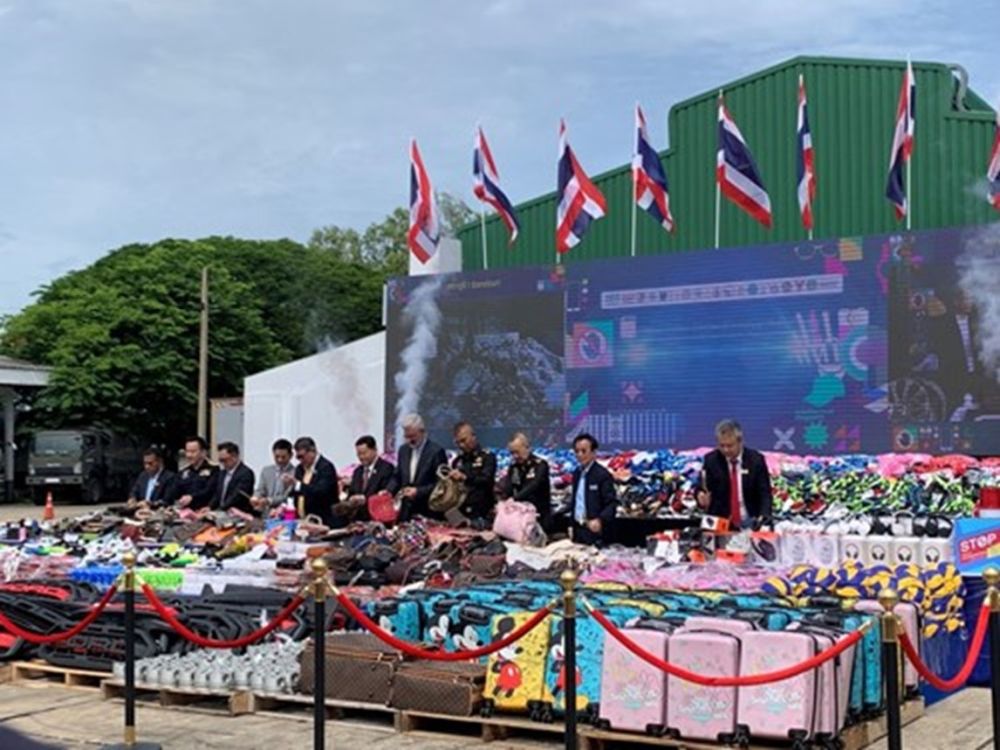
At the opening of the destruction event, honorable attendees participated by cutting and smashing the counterfeit products.
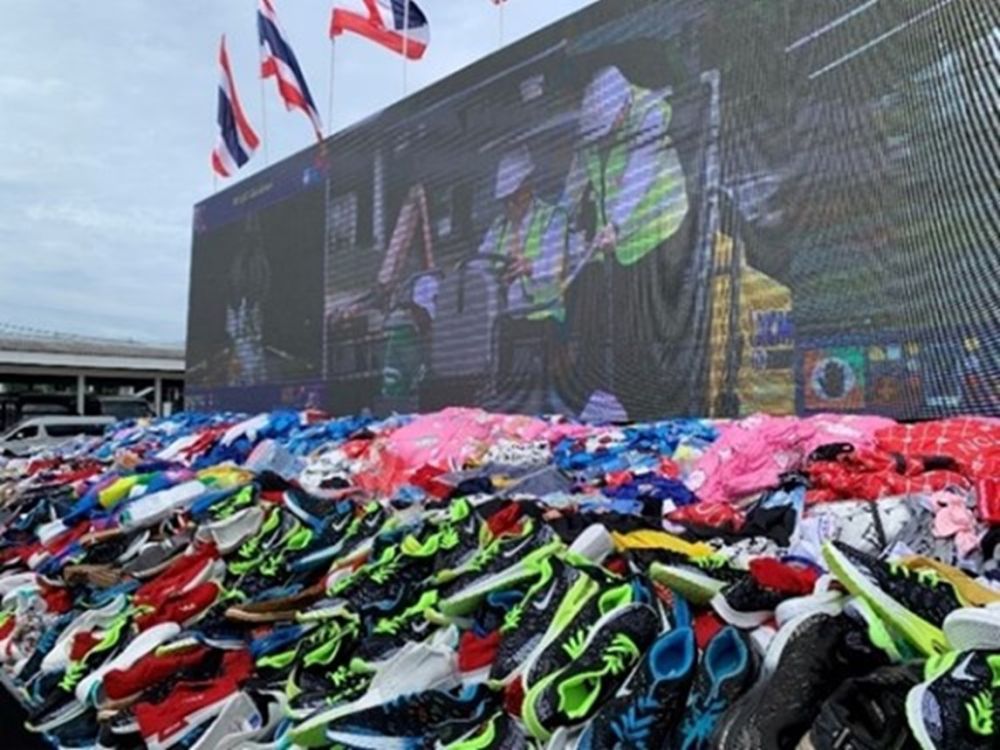
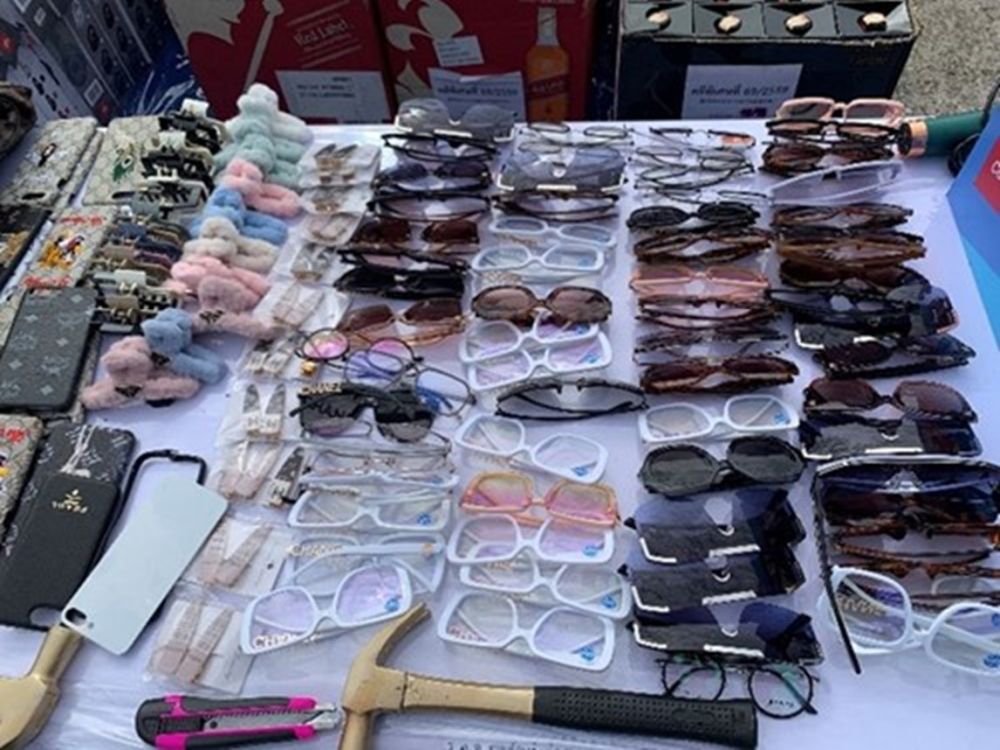
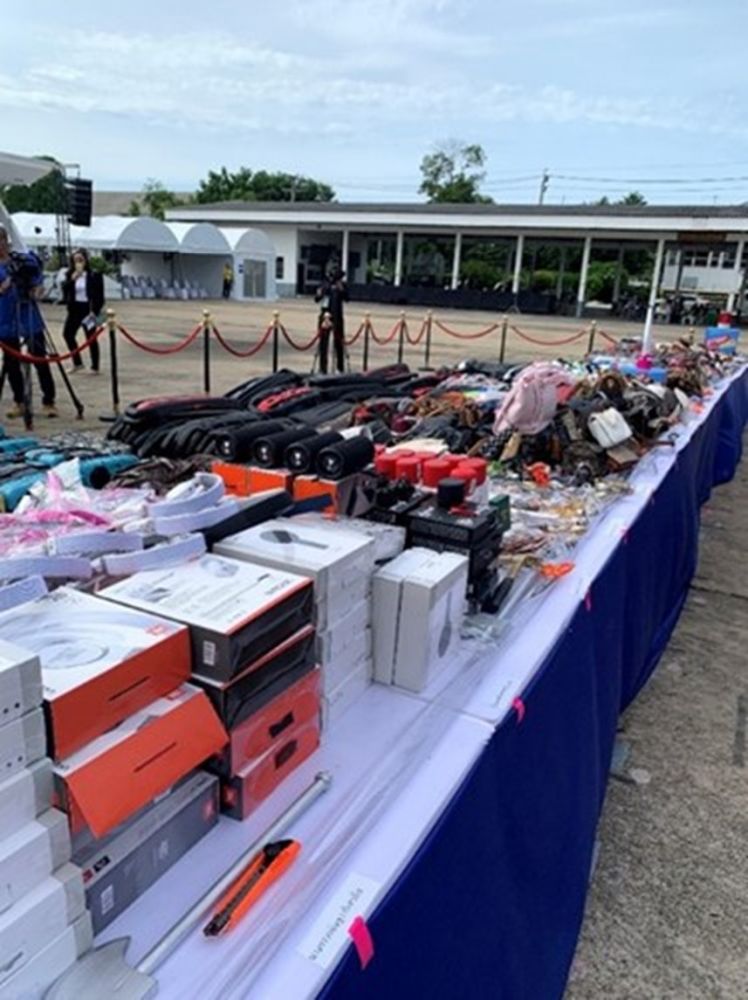
Some photos of counterfeit products.
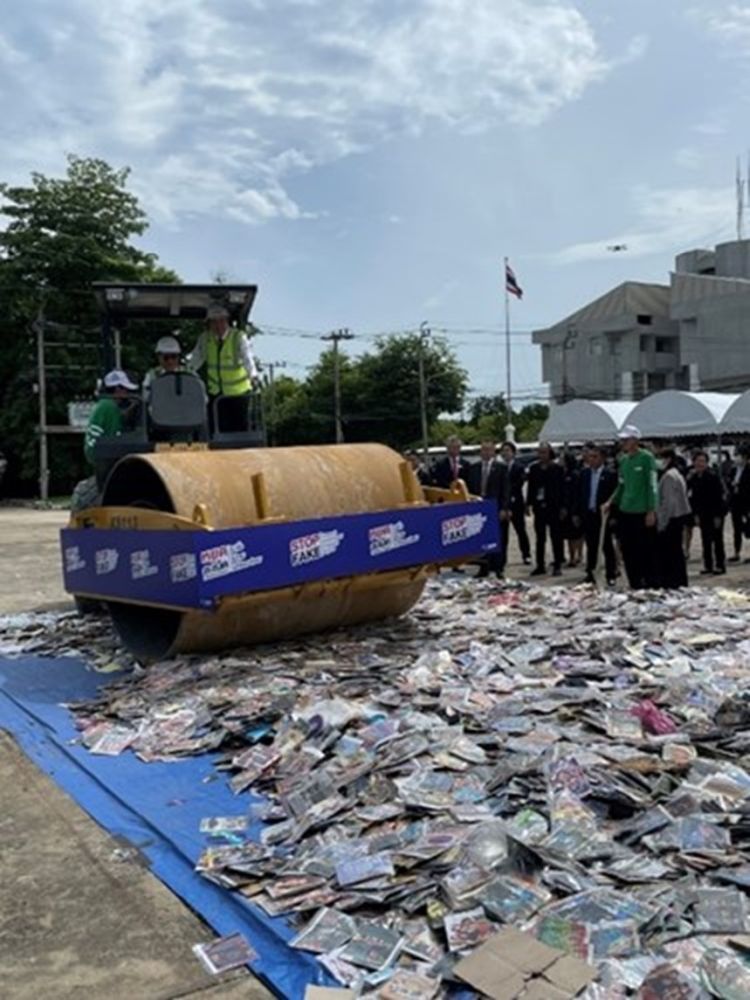
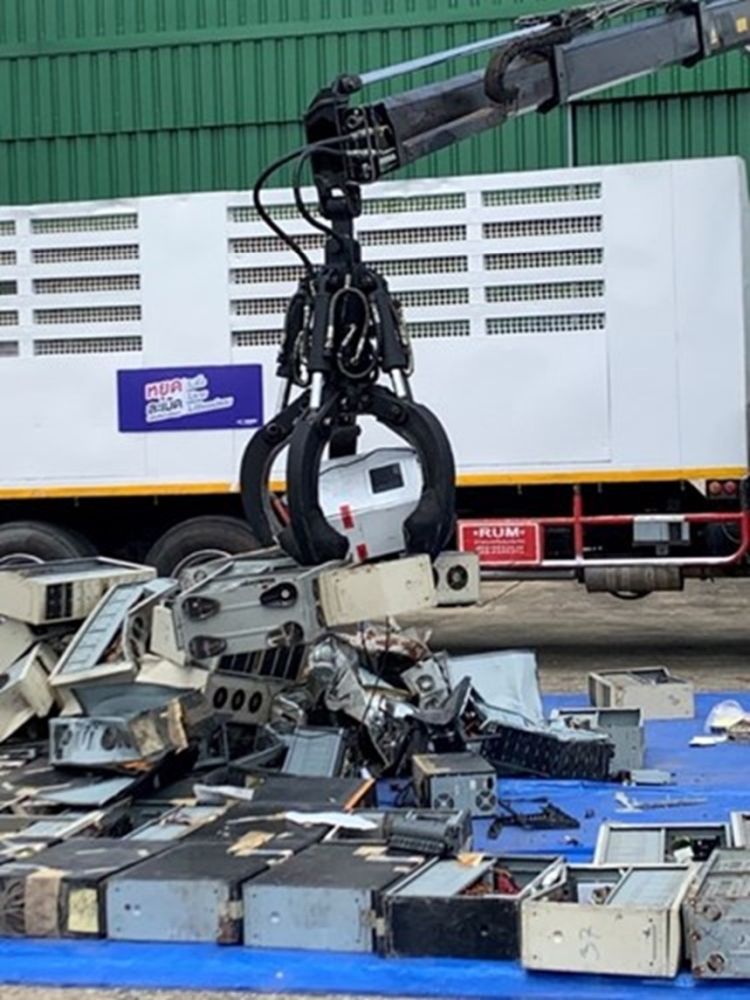
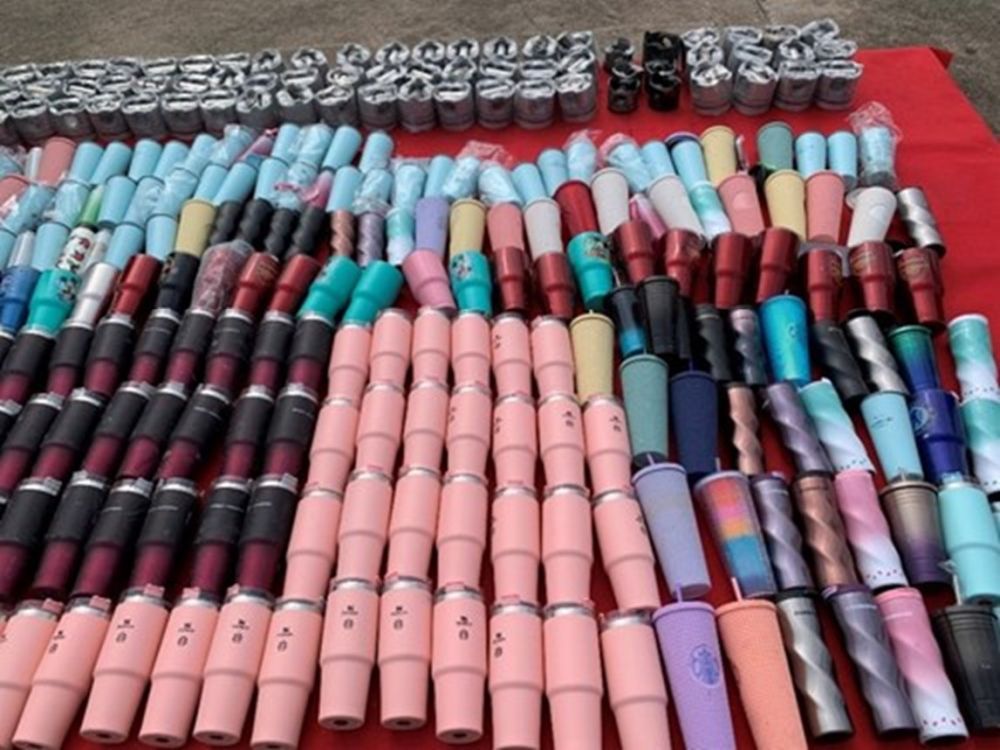
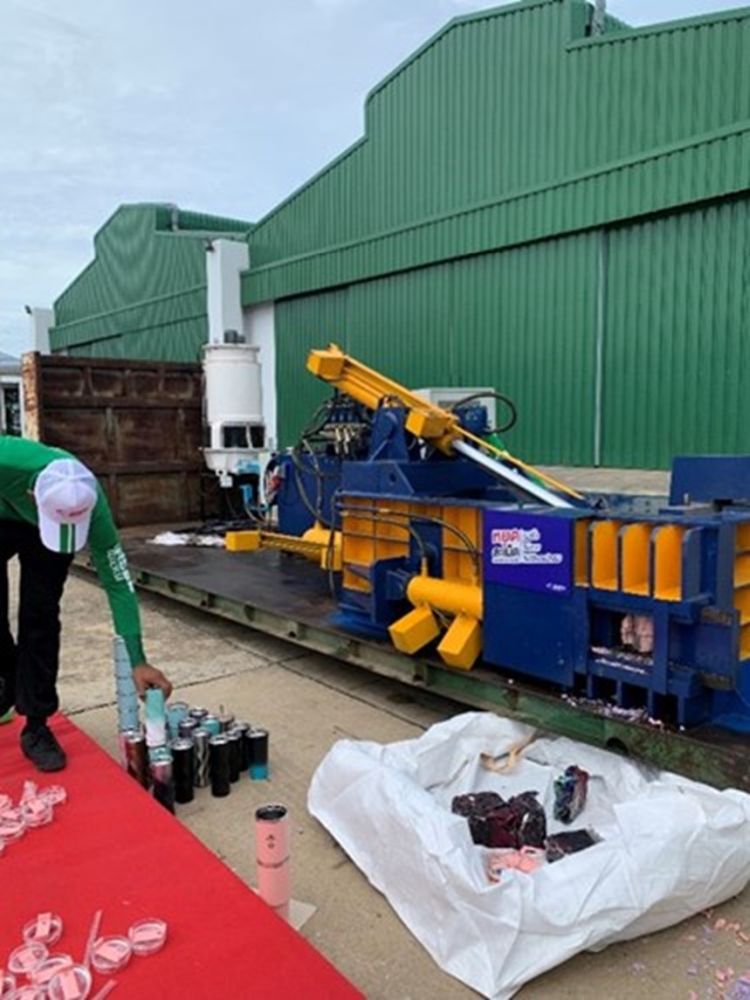
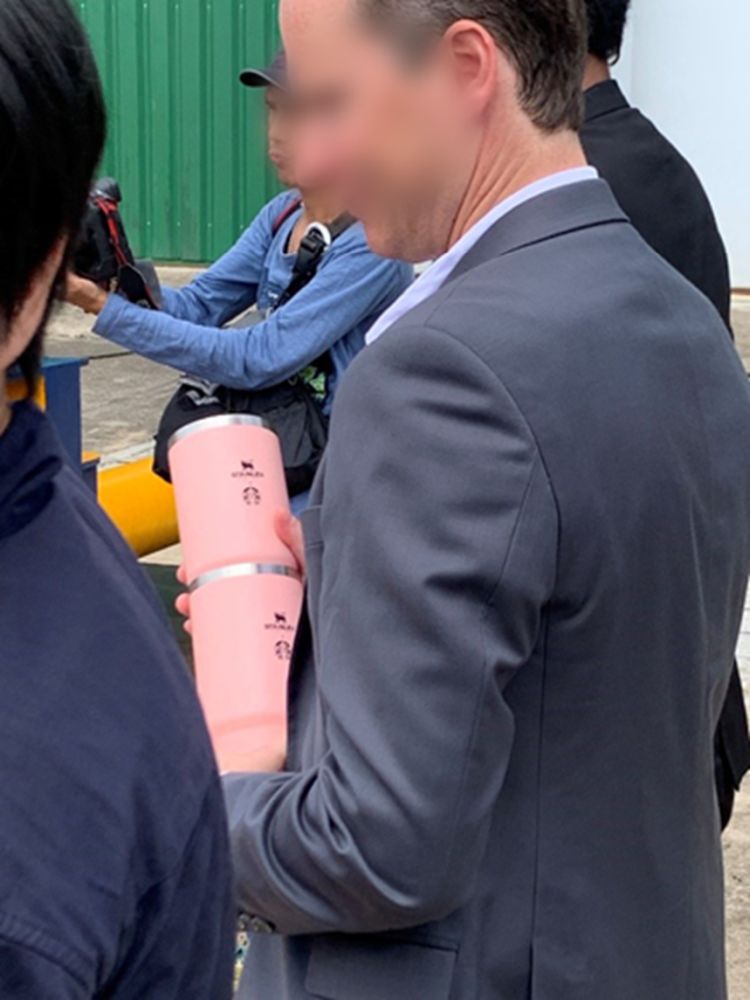
The destruction of counterfeit products employed a range of environmentally friendly methods, including rollers, compactors, and dismantling machines, all managed by skilled experts.
Emerging Trends and Challenges in IP Border Protection in Thailand
The proliferation of counterfeit and imitation products — such as clothing, shoes, bags, and electronics — can be attributed to lower prices, limited public awareness of IP rights, and the rapid growth of e-commerce and transportation industries. In our increasingly globalized world, sellers can easily reach consumers across borders, and the booming transportation sector further facilitates the distribution of these goods.
Simultaneously, infringers are becoming more adept at evading detection. Some employ tactics such as importing counterfeit items in small parcels without branding labels, using air transport, declaring items as unbranded, or mixing infringing products with legitimate goods—all designed to minimize the chances of Customs detection.
To combat these challenges, rights owners should strengthen their collaboration with Customs through recordals and annual training sessions. This proactive approach will enhance brand visibility, aid in the identification of infringing products, keep officers informed about evolving importation methods used by infringers, and ultimately increase the success rate of Customs seizures.
Co-authored by Pin (Jeerisuda) Boonnum (Rouse)
The content of this article is intended to provide a general guide to the subject matter. Specialist advice should be sought about your specific circumstances.


